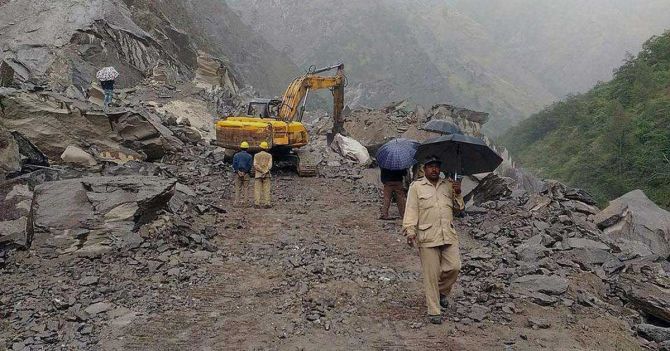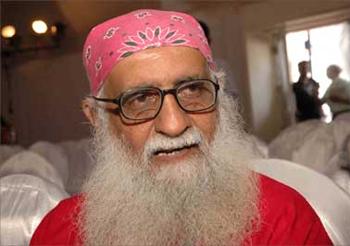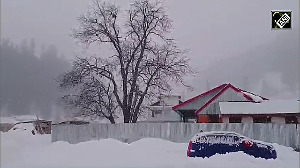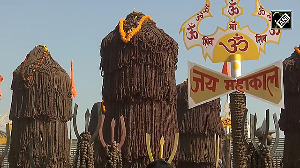'My belief that I could protect the Himalayas was shattered.'

When environmentalist and scientist Dr Ravi Chopra was appointed head of the Supreme Court appointed High Powered Committee (HPC) to oversee the Char Dham highway project, the public in Uttarakhand hoped the recommendations of this committee would ensure their fragile environment would be protected.
Sadly, this did not prove the case and as Dr Chopra wrote in his resignation letter to the secretary general of the Supreme Court last month that 'engineers armed with modern technological weapons (are) assaulting the Himalayas'.
"Environmental wellbeing is not a priority for this nation," Dr Chopra tells Rediff.com Senior Contributor Rashme Sehgal.
Why did you choose to resign from the HPC?
It's very simple. There was a dispute between the minority and the majority (members) so I waited for the final judgment from the Supreme Court.
What was your reaction to the judgment?
I cannot say I was surprised.
Obviously you do not want to make a comment on the Supreme Court judgment. The moot point is why are our government agencies so indifferent to our environment?
Major environmental disasters have occurred because of the Char Dham road widening project and yet these agencies choose to ignore inputs provided to them by leading scientists, activists and the public who are living in this region.
The report of the HPC addressed a number of aspects of road widening. Road width was the key factor for determining the extent of hill cutting and the subsequent environmental damage.
But we also looked at muck dumping, effects on environmental quality loss of forests and tree cover, wildlife impact, loss of springs -- there were ten subject matter chapters in all.
The Supreme Court said they will go by the ministry's latest notifications.
On all the other chapters, the Supreme Court has said the ministry of road transport and highways (MoRTH) and ministry of defence (MoD) must ensure the HPC's recommendations o must be implemented.
While we (the Supreme Court) have granted our approval, it is made conditional on the implementation of the recommendations made by the HPC. So clearly it is not a one sided judgment.
The environmental arguments did have some impact on the court.
But is that enough?
Granted. But this question must be addressed to the court and to the government agencies. I cannot answer for them.

Why I am emphasising this point is because we all know our Himalayas are very fragile and vulnerable. Landslides have been taking place there practically on a daily basis especially through the monsoon months. This has made movement difficult even for the army.
You cannot understand this from me because I cannot speak for the government and the Supreme Court.
I must emphasise that ecological and geological sound practices require a lot of prior investigation of slopes and the building in of redundancies in hazardous and sensitive zones. This means if there are six safety features required, we need to put all of them, we don't say just one or two are required.
Prior investigations and redundancies require time and money.
This project was given an unrealistic deadline which they could not meet and this had to be extended a couple of times.
Such a project requires acceptance of precautionary principle which is accepted in law even by the Supreme Court. There are several cases where they have applied this principle.
Take the case of the Taj Mahal where M C Mehta had asked for removal of foundries around the Taj Mahal as also the removal of foundries.
What was argued was that we had reasons to apprehend they were hazardous for the marble of the Taj Mahal. There was no scientific data, but it was a precautionary principle and this line of argument was accepted by the Supreme Court.
In the same way, the Supreme Court agreed to prohibit the sale of endosulfan even though there was not enough scientific data on this.
It is important for the Supreme Court to apply this precautionary principle, but it is not regularly and consistently applied.
Why is the West more cautionary when dealing with the environment?
I am not sure about this. I have lived in the US long enough to know this is not true.
I was talking about Germany and Switzerland where there is a great deal of environmental consciousness.
The important point to note is that on November 27 2020, the MoD filed an application with the Supreme Court saying we have a problem with your order that width should be 5.5 metres, we need 7 metres which is double lane.
On December 2 2020, the Supreme Court ordered that the HPC hold a meeting to review the MoD application and file a report to the Supreme Court.
Even as were discussing this application on December 15 2020, we received a fresh notification stating that the March 2018 notification has been amended in view of experiences of road construction and widening in mountainous regions.
For purposes of defence, the national highways even in mountains will be 11 metres. And on January 15 2021, the MoD files another fresh application in the Supreme Court that the new application given by the MoRTH was acceptable to them.
Now both the MoD and the MoRTH had the same request to the Supreme Court, and in response to that the Supreme Court replied that they could not second guess the needs of the armed forces and so they accepted it.
That is the point, No one wants to question the MoD.
In a sense, the MoRTH used the MoD as a shield for its argument.
And the MoD went along with it?
Ultimately, sarkar to ek hi hai -- the government is one.
We are allowing our bureaucrats and engineers to get away with increasing numbers of environmental disasters.
This has been going on all the time. When the Madhav Gadgil report came out on the Western Ghats in 2011 elaborating on the kind of environmental practices that should be followed there, the report was completely overturned by the government.
You issued a statement that you had hoped the HPC could protect the fragile ecology of the Himalayas, but this belief had been shattered. This is a very strong indictment of government policy. What made you say it?
It has been shattered because we had presented an argument for an intermediate width based on the ministry's own recommendations of 2018. And because that had been the notification of the MoRTH, Justice (Rohinton) Nariman had accepted our argument.
The kind of manipulation that occurred was quite shocking.
Following the first meeting of the HPC in September 2019, we started giving recommendations to MoRTH engineers for mitigating and minimising damage we had observed on our field trips. This was as desired by the terms of reference of the committee.
Either our recommendations were ignored by the engineers or the response came very late.
I will give you three examples:
In our first meeting in 2019, we asked the ministry to commission to rapid environment assessment. The contract letter was issued in June 2020 at a time when the JPC was finalising its report. And the rapid environmental assessment came in September 2020, after the Supreme Court's order.
From early March 2020, we had started informing the ministry's engineers to prepare a list of vulnerable sites and prepare protection measures for these sites before the monsoon.
A preliminary list was given to us in May 2020.
In October 2019, in our field visit in one location in the Mandakini valley, we saw a bypass was to be built through a dense forests. Local people had opposed it.
We told PWD contractors and engineers to delay the bypass and they agreed to delay its construction till further guidance.
When we went there six weeks later in November 2019, we found road construction had started. They just ignored our recommendations.
Since this was the response of the ministry, I did not want to continue in an ineffective committee.
My belief that I could protect the Himalayas was shattered.
Now they have a retired judge of the Supreme Court heading the committee. Let us wish him more luck.
Retired Supreme Court judges are being appointed, but how many have an understanding about the environment?
The MoD had in its application in November 2020 asked for the widening of the three defence roads, Rishikesh to Mana, Rishikesh to Gangotri and Tanakpur to Pithoragarh.
Besides these three roads, the Charm Dham yojana had other roads, one from Rudraprayag to Sitapur, the other is from Dharasu to Yamunotri but these are not defence roads. They do not lead up to the borders.
The Supreme Court told the respondents that if you want the non defence roads to be widened also, then you can come to us for their renewal.
So now MoRTH will go back to the Supreme Court and inform them that we have completed our plans so please let us go ahead and widen these roads.
 IMAGE: Dr Ravi Chopra. Photograph: Sreeram Selvaraj/Rediff.com
IMAGE: Dr Ravi Chopra. Photograph: Sreeram Selvaraj/Rediff.comEnvironmental protection had no importance in the current election campaigns.
The political parties have a ear to the ground. Maybe the public is not raising these issues to the extent they should.
There were local protests against landslides, there are local protests against demolition of homes and shops, but the way media is organised, what happens in one place not heard in another. So we never hear about these local protests
Political parties do not amplify these protests?
Our political parties have never said anything against development projects.
Sand mining in the Ganga is being done in open defiance of the law. The National Mission for Clean Ganga is issuing notifications and orders, but even the district magistrate does not bother to obey them.
Environmental wellbeing is not a priority for this nation.
An environmental penalty clause should be put in place.
There are already such rules. I have heard contractors and the sand mining mafia do not hesitate to pay the fine.
Feature Presentation: Ashish Narsale/Rediff.com











 © 2025
© 2025